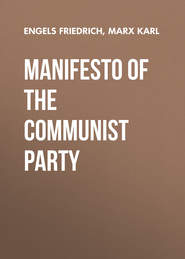По всем вопросам обращайтесь на: info@litportal.ru
(©) 2003-2024.
✖
Revolution and Counter-Revolution; Or, Germany in 1848
Настройки чтения
Размер шрифта
Высота строк
Поля
"When the last of crowns like glass shall break,
On the scene our sorrows have haunted,
And the people the last dread 'Guilty' shall speak,
By your side ye shall find me undaunted.
On Rhine or on Danube, in word and deed,
You shall witness, true to his vow,
On the wrecks of thrones, in the midst of the freed
The rebel who greets you now."
(Translated by Ernest Jones.)
9
The "Wolff" here alluded to is Wilhelm Wolff, the beloved friend of Marx and Engels, who – to distinguish him from the many other "Wolffs" in the movement at this period – was known to his intimates as "Lupus." It is to this Silesian peasant that Marx dedicated the first volume of "Capital."
"Dedicated To My Never-To-Be-Forgotten Friend The Brave, True, Noble Fighter In The Van-Guard Of The Proletariat, WILHELM WOLFF
Born at Tornau, June 21st, 1809. Died in exile at Manchester, 9th May, 1864."
10
After repeated search I have been unable to find the "next letter" referred to in the above paragraph; and, if it was ever written, there seems no doubt it was never published. – E. M. A.
11
"The Manifesto." This is the celebrated "Communist Manifesto," which the Communist Congress, held in London, November, 1847, delegated Marx and Engels to draw up. It was published in 1848 (in London). The fundamental proposition of the Manifesto, Engels writes in his introduction to the "Communist Manifesto," translated by S. Moore, and published by W. Reeves, "is that in every historical epoch, the prevailing mode of economic production and exchange, and the social organization necessarily following from it, form the basis upon which is built up, and from which alone can be explained, the political and intellectual history of that epoch; that consequently the whole history of mankind has been a history of class struggles, contests between exploiting and exploited, ruling and oppressed classes; that nowadays a stage has been reached where the exploited and oppressed class – the proletariat – cannot attain its emancipation … without at the same time, and once and for all emancipating society at large from all exploitation, oppression, class distinctions, and class struggles." As to this fundamental proposition of the Manifesto, it "belongs," says Engels, "wholly and solely to Marx." The "Communist Manifesto" has been translated into well-nigh every language, and is, again to quote Engels, "the most international production of all Socialist literature."










